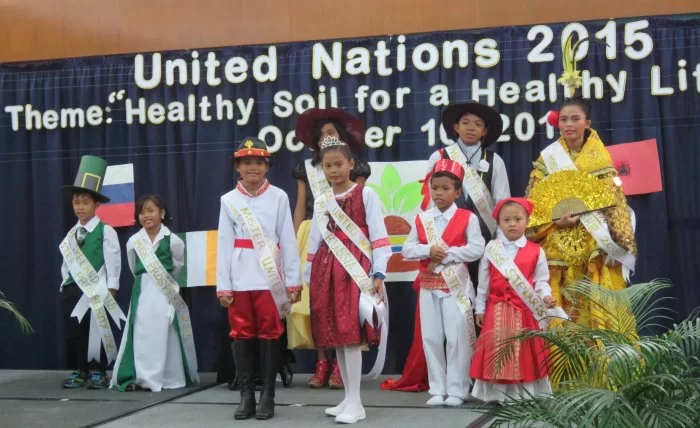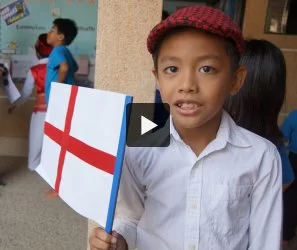"If I have the gift of prophecy and can fathom all mysteries and all knowledge, and if I have a faith that can move mountains, but do not have love, I am nothing."
(1 Corinthians 13:2, NIV)
Make no mistake, your prayers, faith, and love have been moving mountains! Last month I had mentioned a deep concern felt by all of us at CSC; that the partial closure of government offices would make it difficult, if not impossible, for us to process paperwork and manage the cases of our children. Travel restrictions, quarantine protocols, and roadblocks (literally speaking) have hindered our team's ability to submit paperwork and gather needed information. The pandemic has limited the functional capacity of DSWD (the Department of Social Welfare and Development) and ICAB (the Inter-Country Adoption Board), affecting our ability to work with them on receiving referrals of new children and/or advocating for the matching of our current children with prospective adoptive parents.

But we have a talented and proactive team, faithful and diligent supporters (like all of you!), and a God that is always at work, moving us forward in our mission to serve and provide a loving, Christ-centered home for homeless Filipino children. Your prayers are being felt; coupled with your faith and love, your prayers are moving mountains! We can't thank you enough for being a part of what the Lord is doing.
Government offices have been opening with a reduced workforce, and new virtual procedures (utilizing Zoom and Skype) have been developed for us to advocate for our kids before DSWD and ICAB. And, in what can only be described as a miracle, there is now some movement when it comes to international placements, and even international travel, for prospective adoptive parents. At present, the Philippine government is prohibiting foreign nationals from traveling to the islands, with very few exceptions. It is amazing, and an answered prayer, that the national government and ICAB would consider the needs of prospective adoptive families from overseas, adding them to the list of exceptions for travel.
There are still many hurdles to jump. Local matching (that is, matching done with prospective adoptive families within the Philippines) is happening at a fraction of the pace that it was before the pandemic. We also have yet to go through the process of welcoming an international adoptive family and navigate everything that entails (getting them through roadblocks and checkpoints, etc.). Please continue praying with us as we make our plans and preparations, and PRAISE GOD for the doors He has already opened!
Last but not least, please pray for the people of Cebu. Heavy rains have already caused a lot of flooding in and around the city. It is also evident that the pandemic will reverse years of progress that the city, and the country, have made towards reducing extreme poverty. Recent reports show that around 2 million more Filipinos will slide into poverty this year, with estimates stating that 22.4% of the country's population will drop, or remain, below the poverty line. Pray that we can continue sharing the love of Christ in word and in deed through this unique time.

Flooding along Mango (Maxilom) Ave, near Gorordo Ave, in Cebu City on October 13th.


Flooding in Barangay Carreta, Cebu City, on October 23rd.
Teachers Learning
Teachers put in years of hard work learning in college to prepare themselves to step into the classroom to teach. There are many attributes which can characterize a good teacher—knowledge, preparation, enthusiasm, connecting with the students, patience, and on and on.
The ability to learn is one of the attributes that can benefit any teacher. There are new curriculums, methods, approaches, and theories. And every year there are new students.
All students are different. Some are similar in the ways they learn and how fast they understand and absorb knowledge. Others have a different pace and others need alternate explanations. A teacher’s ability to learn the best learning style, process, and pace for each student in the class is instrumental in helping the student understand the lesson.
The Children of Hope School teachers are impressive. There is a range of learning styles represented in the student body and the teachers have been working hard at understanding each student.
Here is one example. Wilmar is an active teenager who is still learning the sounds of each letter. His focus is easily broken and he sometimes has a hard time sitting still. However, he is enthusiastic about most things and is great at memorizing melodies and lyrics of songs. His confidence in front of a group of people has helped the adults around Wilmar to realize his learning capabilities and potential.
Wilmar’s class needed to put on a presentation for Buwan ng Wika, just like all the other classes. They chose to do a dance. Wilmar has trouble following set choreography and usually makes up his own moves. How does a teacher handle a student who struggles to follow set steps of dance, but is great in musical settings? Watch to see Teacher Alfie’s solution to help Wilmar’s class put on a good presentation with the participation of all students.
From big performances to basic classroom instructions, the teachers of Children of Hope School are meeting the students each and every day, learning how to guide them.
Group 1 Girls
Individualized Instruction (II) at CCHS is an intervention that helps students improve their academic skills, especially in reading. But teaching II with Group 1 has been a bit different since it is a group of lively little girls rather than a one-on-one session. They practice their beginning reading skills by reviewing their story selections and high frequency words. After that they choose a book from the classroom mini-library and I read it to them. The girls take turns choosing the book for the day. Recently one of the girls chose the book Why? by Miriam Frost. This book is full of “why” questions, so it’s perfect for building reading comprehension skills.
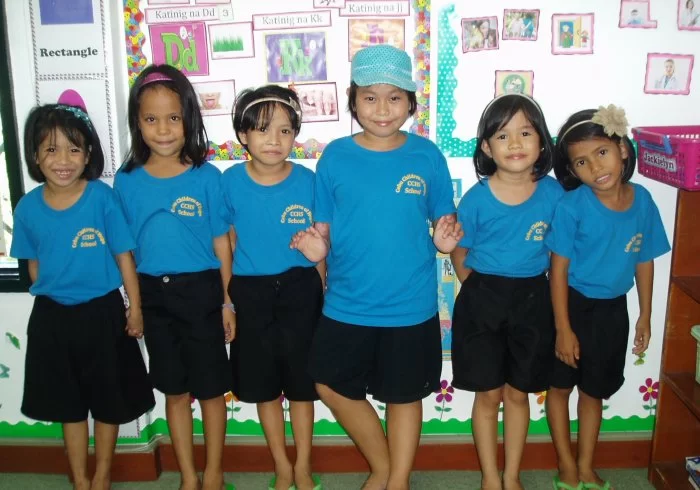 The conversation while reading the book with
the girls went something like this:
The conversation while reading the book with
the girls went something like this:
Question: Why is the snow cold and not warm?
Answer: Because it’s ice.
Question: Why do we fall down but not up?
Answer: Because we slide.
Question: Why do bats sleep upside down but not right side up?
Answer: Because the bats don’t have hands to hold. That’s why he sleeps that way.
Question: Why do we stand on our feet but not on our hands?
Answer: Alangan! matumba manta if mag tindog sa atong kamot. (English translation: We will fall down if we use our hands.) This was said in a tone of voice implying, oh come on teacher, you know the answer!
The girls are very cute! My prayer is that they will continue to love and value books as they grow up.
"BER" Months and Kid Volunteers
“Ber” Months and Kid Volunteers
September, October, November and December are known in the Philippines as the “Ber” months for obvious reasons. When these months arrive, Filipinos begin to get excited. These months herald the arrival of a celebration that most Filipinos love, and that is Christmas. Christmas music is played at times as early as the first few weeks of September.
Like most Filipinos, the children at the shelter are starting to think about Christmas. The kids who had experienced the month-long celebration at the shelter already told the new kids the fun things that happened last year. Some have already asked when the progressive dinner will be and some have started to wonder and ask what Santa will do for fun on Christmas eve.
One fun thing that happens at the shelter during December is the party for outreach kids. This year it will happen on Saturday, December 12. Two or three of the older kids usually help with the party by being on the registration table. When that is done, they help the other older kids by helping give away candies and other sweets while games are going on. Then they help distribute the snacks when it is time for that. Then when it is time for gifts and give-aways to be given, they also assist Santa with the distribution.
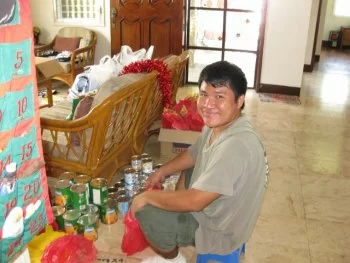
Julieto bagging give-aways.
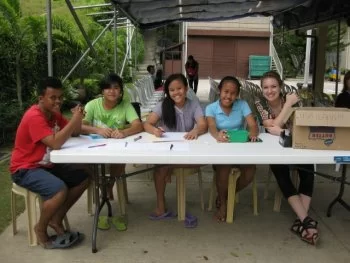
Registration table

Girls having fun after helping the outreach party.
It is fun to see the kids helping other kids in need. And it is always fun when they volunteer themselves to help when help is needed.
Roles!
Workers at CSC have different roles. Some are childcare leaders, teachers, nurses, house parents, therapists, cooks, guards, and so on. Sometimes though, we go beyond our roles.
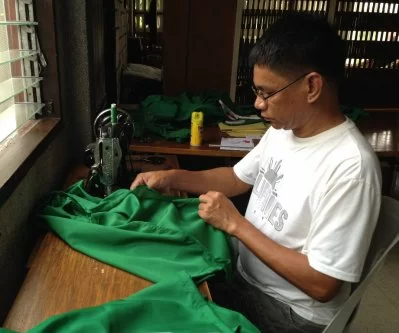
Uncle Ondoy is a house father at our Teen Home, but every now and then you see him sewing costumes for the kids’ school presentations.
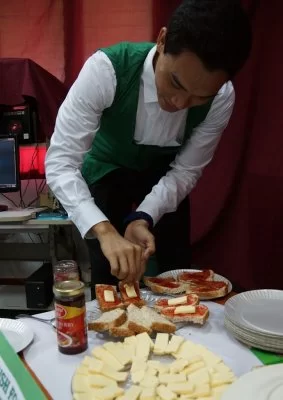
Marwin is a Physical Therapist. Once in a while he dresses up like he’s Irish and serves Irish food. Therapists work between the shelter and school and they help in some school programs—like United Nations Day.
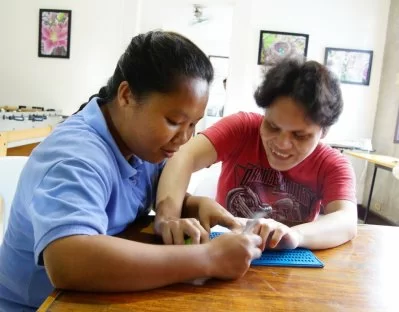
Roselyn is one of our adult residents at the Teen Home. She is now working at our school as a teaching assistant. Roselyn is also good with braille. She helps Arleen—also one of our adult residents—with transcribing words into braille.
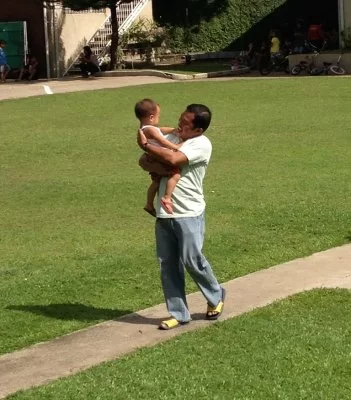
Uncle Edwin is one of our trusted drivers. He knows which roads to take to cut distances. Sometimes you see him being silly on the playground with a toddler.
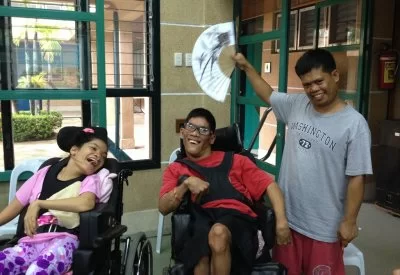
Everyone knows Joemar. He works at two branches of McDonald’s. Joemar also assists the janitors at school. But beyond that, he is a kind and loving friend to Ginda and Jacob.
And that is how we rock our roles at CSC!
United Nations Day
Friday was an exciting day at Cebu Children of Hope School! The kids got to travel to Russia, Spain, Albania, Ireland, and England. They presented their passport and had to answer questions in order to enter each country. Once admitted into the country they learned about their culture, famous attractions, did an art activity and sampled a food from that country.
In the afternoon two representatives
from each country dressed in their countries native attire. They were asked to
give a greeting from their country and answer questions in front of the
audience. Select students performed dances from some of the various countries.
At the end of the day the representatives from Russia were crowned Mister and
Miss United Nations 2015. 